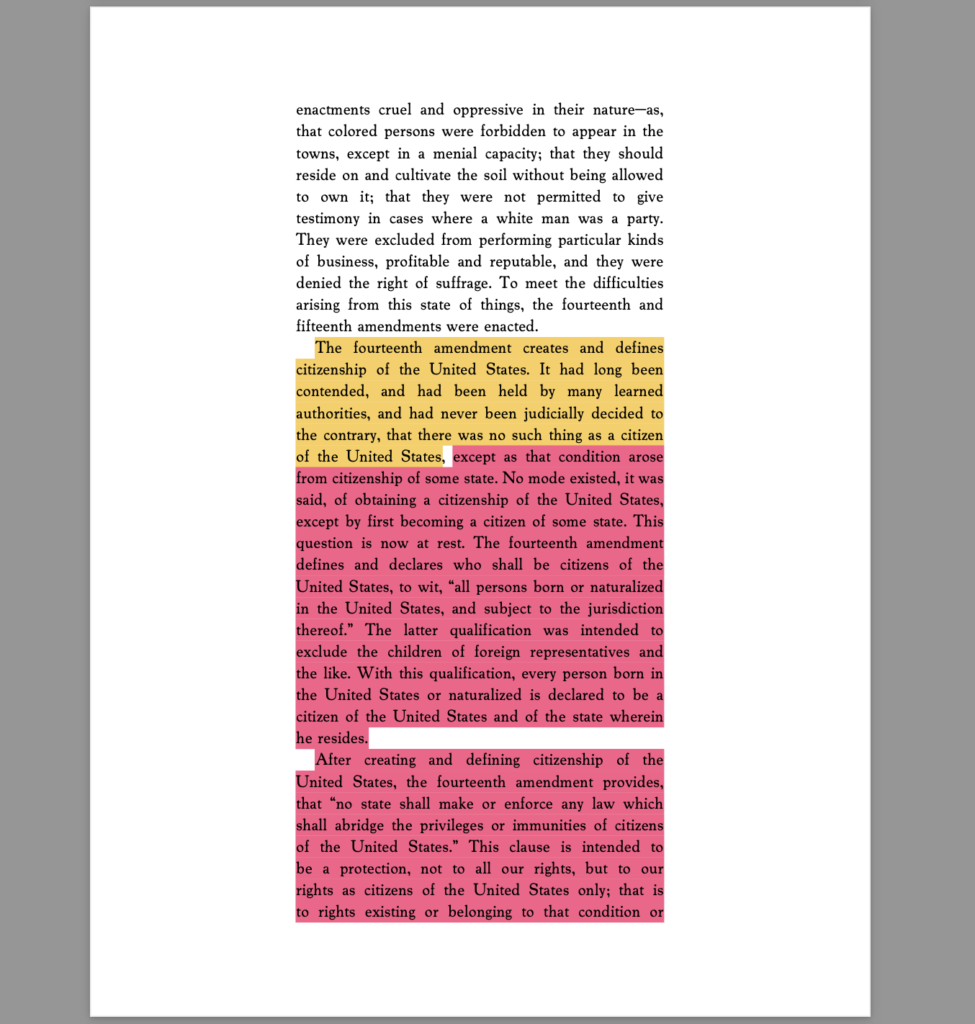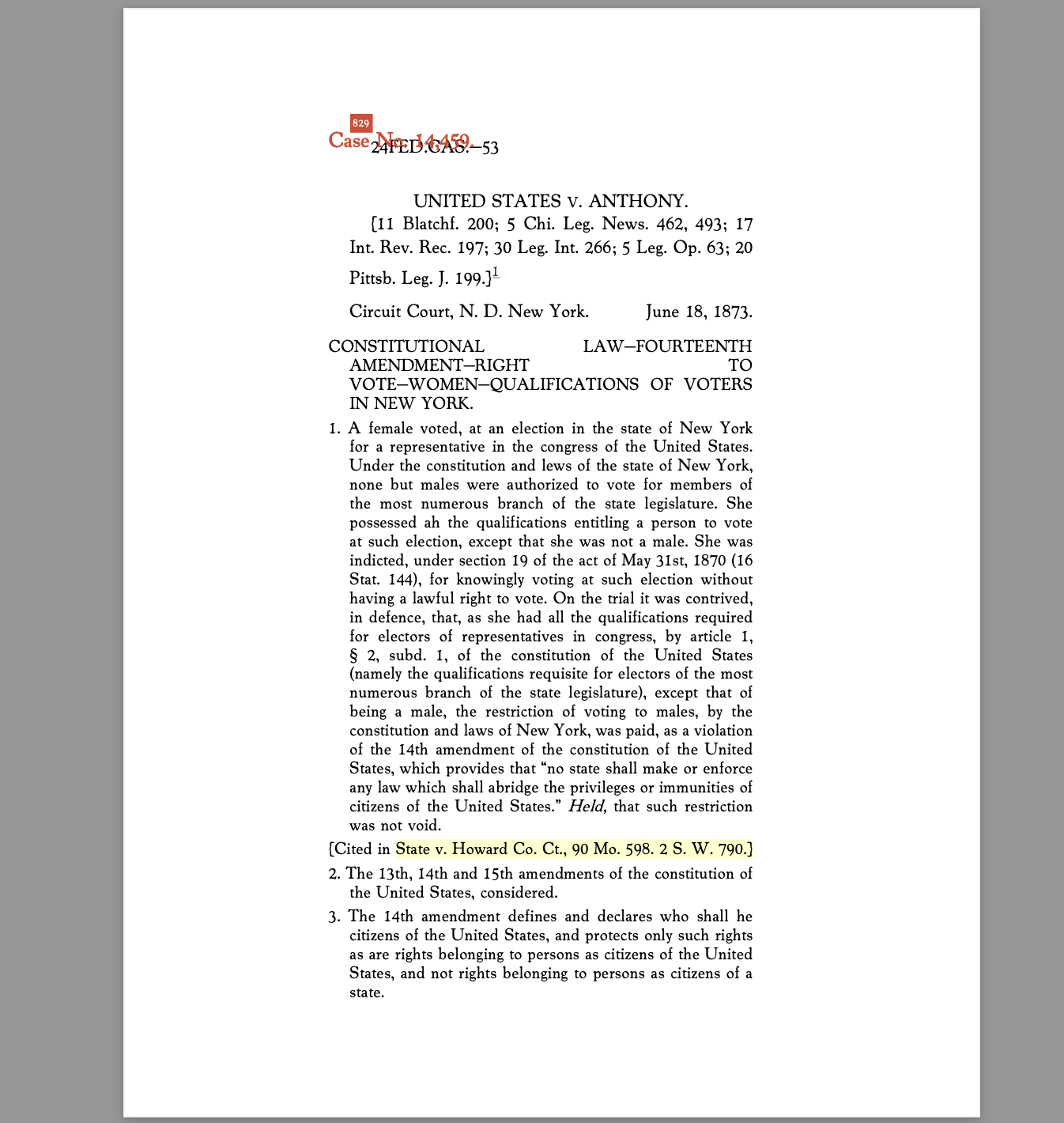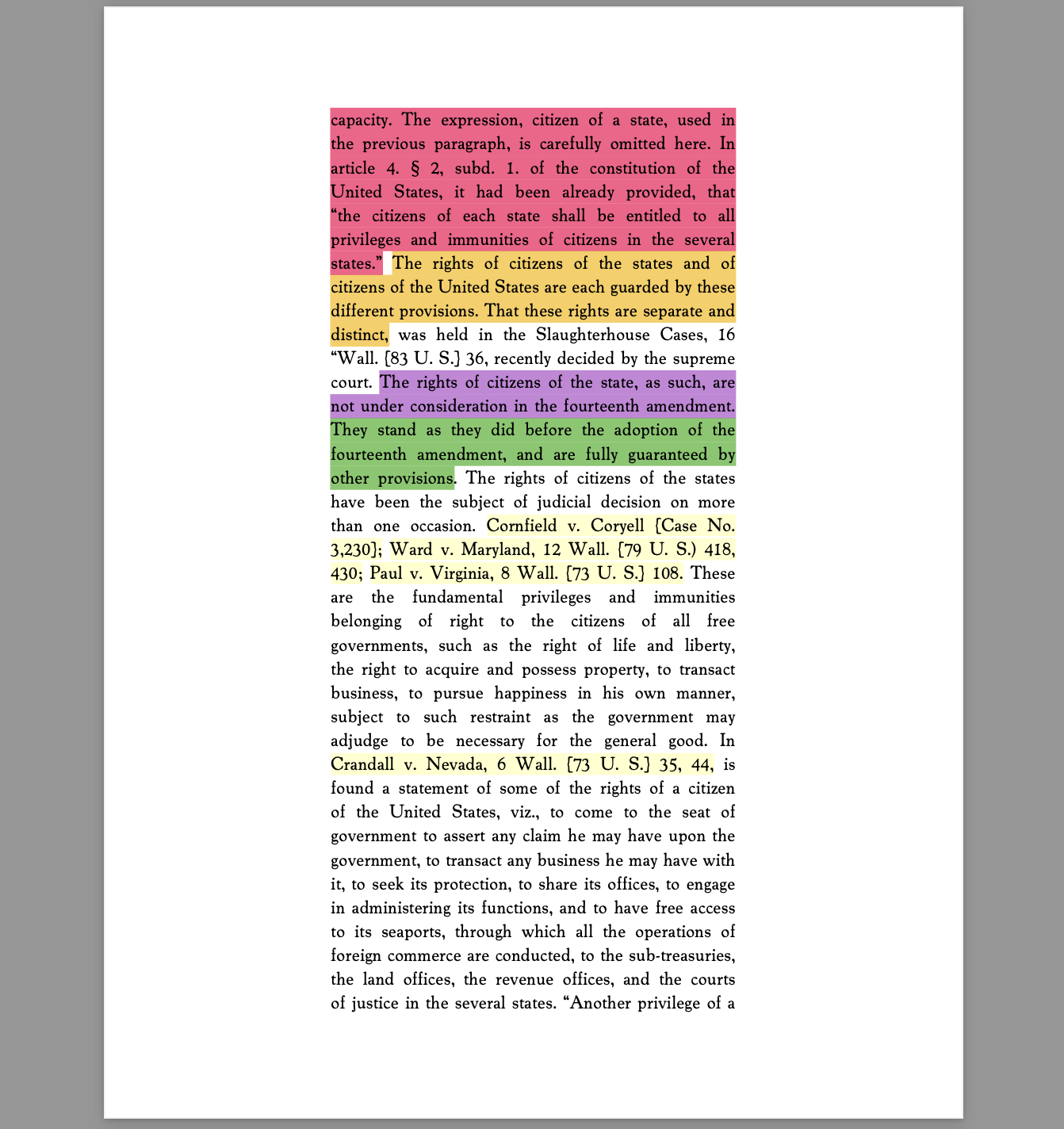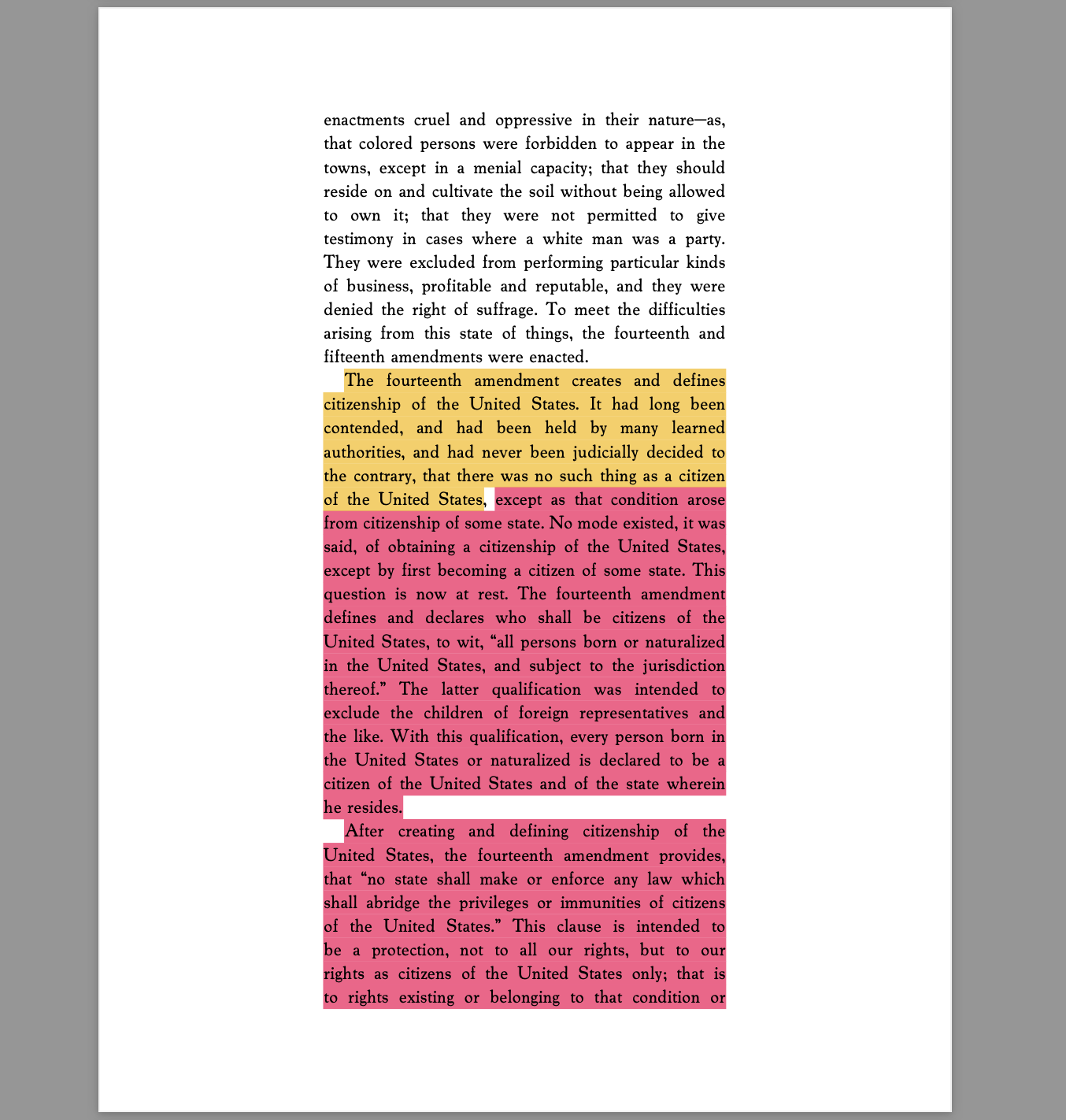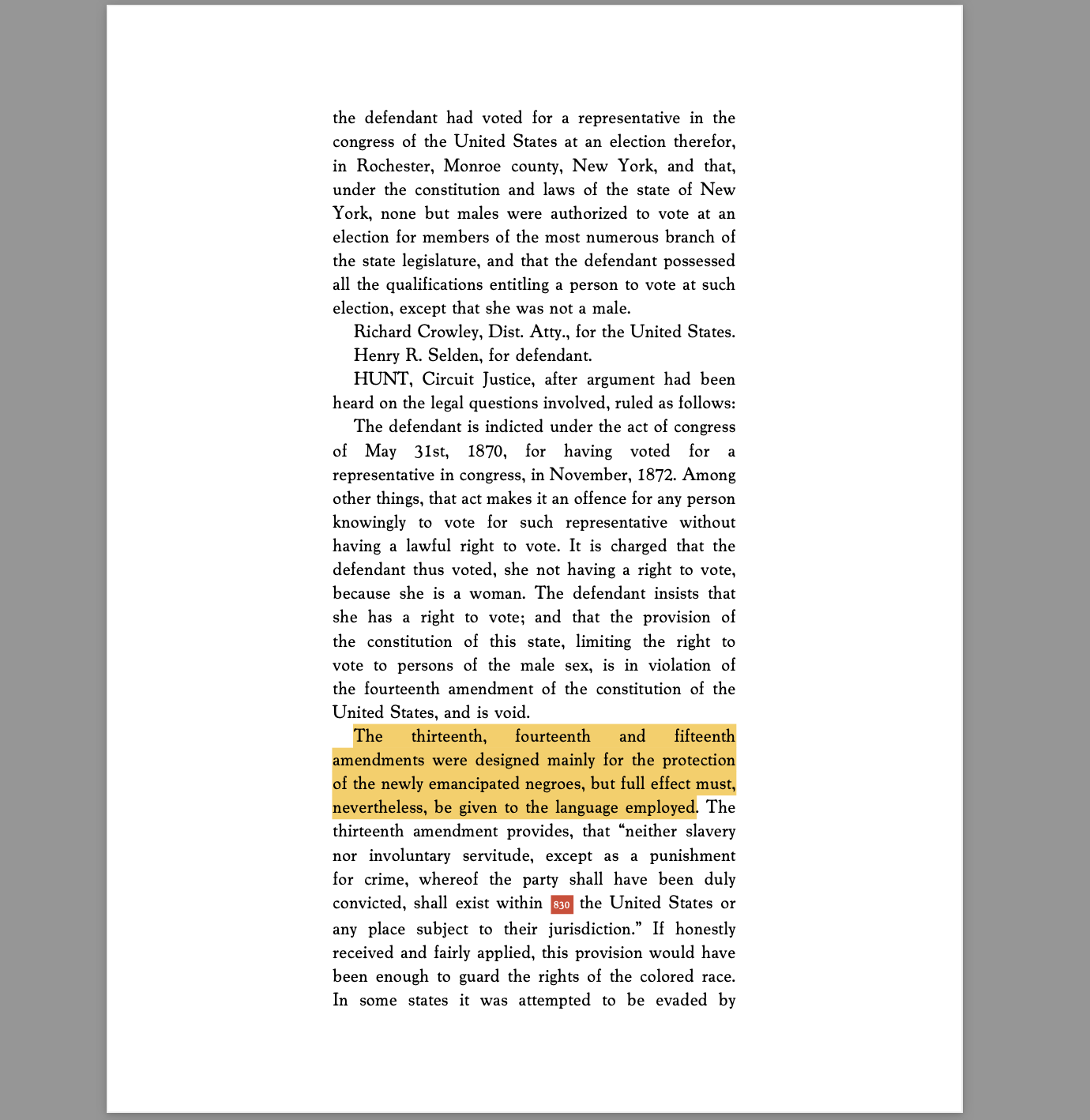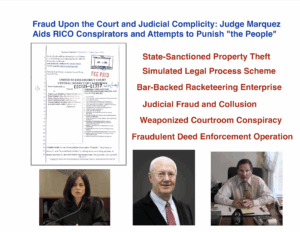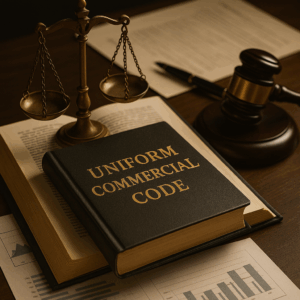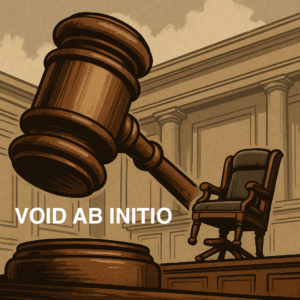Case No. 14,459.
24FED.CAS.—53
UNITED STATES V. ANTHONY.
[11 Blatchf. 200; 5 Chi. Leg. News. 462, 493; 17 Int. Rev. Rec. 197; 30 Leg. Int. 266; 5 Leg. Op. 63; 20
Pittsb. Leg. J. 199.]1
Circuit Court, N. D. New York. June 18, 1873.
CONSTITUTIONAL LAW—FOURTEENTH AMENDMENT—RIGHT TO VOTE—WOMEN—QUALIFICATIONS OF VOTERS IN NEW YORK.
1. A female voted, at an election in the state of New York for a representative in the congress of the United States. Under the constitution and lews of the state of New York, none but males were authorized to vote for members of the most numerous branch of the state legislature. She possessed ah the qualifications entitling a person to vote at such election, except that she was not a male. She was indicted, under section 19 of the act of May 31st, 1870 (16 Stat. 144), for knowingly voting at such election without having a lawful right to vote. On the trial it was contrived, in defence, that, as she had all the qualifications required for electors of representatives in congress, by article 1, § 2, subd. 1, of the constitution of the United States (namely the qualifications requisite for electors of the most numerous branch of the state legislature), except that of being a male, the restriction of voting to males, by the constitution and laws of New York, was paid, as a violation of the 14th amendment of the constitution of the United States, which provides that “no state shall make or enforce any law which shall abridge the privileges or immunities of citizens of the United States.” Held, that such restriction was not void.
[Cited in State v. Howard Co. Ct., 90 Mo. 598. 2 S. W. 790.] 2. The 13th, 14th and 15th amendments of the constitution of
the United States, considered.
3. The 14th amendment defines and declares who shall he citizens of the United States, and protects only such rights as are rights belonging to persons as citizens of the United States, and not rights belonging to persons as citizens of a state.
4. The rights of citizens of a state defined.
5. The right or privilege of voting is one arising under the constitution of the state, and not under the constitution of the United States.
[Cited in Kinneer v. Weds, 144 Mass. 498, 11 N. E. 919.]
6. It is no defence to such indictment, that the defendant believed she had a right to vote, and voted in reliance on that belief.
[Cited in
7. The defendant, knowing that she was a female, and that the constitution of New York prohibited her from voting, and having voted, the court refused to submit to the jury the question whether she intended, by voting, to violate the statute, or any other question, and directed the jury to find a verdict of guilty, and denied a request, by the defendant’s counsel, that the jury be polled. Held, on a motion for a new trial, that suet direction was proper, and not a violation of the right of trial by jury.
8. On the trial of an indictment, the court has the power, and it is its duty, to direct a verdict of guilty, whenever the facts constituting guilt are undisputed.
[Cited in Disapproved in
[Cited in Disapproved in
The defendant [Susan B. Anthony], a female, was indicted for a violation of the 19th section of the act of May 31st, 1870 (16 Stat. 144), which provides, “that if, at any election for representative * * in the congress of the United States, any person shall knowingly * * vote without having a lawful right to vote, * * every such person shall be deemed guilty of a crime, and shall, for such crime, be liable to prosecution in any court of the United States of competent jurisdiction, and, on conviction thereof, shall be punished by a fine not exceeding five hundred dollars, or by imprisonment for a term not exceeding three years, or both, in the discretion of the court, and shall pay the costs of prosecution.” The trial took place before HUNT, Circuit Justice, and a jury. There was no dispute that
25 Fed 426.]
U. S. v. Watkinds, 6 Fed. 154; The Ambrose Ligbt,
U. S. v. Babcock, Case No. 14,486.
U. S. v. Taylor, 11 Fed. 471.]
State v. Burpee, 65 Vt. 3, 25 Atl. 964.
Territory v. Kee (N. M.) 25 Pac. 926.]
the defendant had voted for a representative in the congress of the United States at an election therefor, in Rochester, Monroe county, New York, and that, under the constitution and laws of the state of New York, none but males were authorized to vote at an election for members of the most numerous branch of the state legislature, and that the defendant possessed all the qualifications entitling a person to vote at such election, except that she was not a male.
Richard Crowley, Dist. Atty., for the United States. Henry R. Selden, for defendant.
HUNT, Circuit Justice, after argument had been
heard on the legal questions involved, ruled as follows: The defendant is indicted under the act of congress of May 31st, 1870, for having voted for a representative in congress, in November, 1872. Among other things, that act makes it an offence for any person knowingly to vote for such representative without having a lawful right to vote. It is charged that the defendant thus voted, she not having a right to vote, because she is a woman. The defendant insists that she has a right to vote; and that the provision of the constitution of this state, limiting the right to vote to persons of the male sex, is in violation of the fourteenth amendment of the constitution of the
United States, and is void.
The thirteenth, fourteenth and fifteenth amendments were designed mainly for the protection of the newly emancipated negroes, but full effect must, nevertheless, be given to the language employed. The thirteenth amendment provides, that “neither slavery nor involuntary servitude, except as a punishment for crime, whereof the party shall have been duly convicted, shall exist within 830 the United States or any place subject to their jurisdiction.” If honestly received and fairly applied, this provision would have been enough to guard the rights of the colored race. In some states it was attempted to be evaded by enactments cruel and oppressive in their nature—as, that colored persons were forbidden to appear in the towns, except in a menial capacity; that they should reside on and cultivate the soil without being allowed to own it; that they were not permitted to give testimony in cases where a white man was a party. They were excluded from performing particular kinds of business, profitable and reputable, and they were denied the right of suffrage. To meet the difficulties arising from this state of things, the fourteenth and fifteenth amendments were enacted.
The fourteenth amendment creates and defines citizenship of the United States. It had long been contended, and had been held by many learned authorities, and had never been judicially decided to the contrary, that there was no such thing as a citizen of the United States, except as that condition arose from citizenship of some state. No mode existed, it was said, of obtaining a citizenship of the United States, except by first becoming a citizen of some state. This question is now at rest. The fourteenth amendment defines and declares who shall be citizens of the United States, to wit, “all persons born or naturalized in the United States, and subject to the jurisdiction thereof.” The latter qualification was intended to exclude the children of foreign representatives and the like. With this qualification, every person born in the United States or naturalized is declared to be a citizen of the United States and of the state wherein he resides.
After creating and defining citizenship of the United States, the fourteenth amendment provides, that “no state shall make or enforce any law which shall abridge the privileges or immunities of citizens of the United States.” This clause is intended to be a protection, not to all our rights, but to our rights as citizens of the United States only; that is to rights existing or belonging to that condition or capacity. The expression, citizen of a state, used in the previous paragraph, is carefully omitted here. In article 4. § 2, subd. 1. of the constitution of the United States, it had been already provided, that “the citizens of each state shall be entitled to all privileges and immunities of citizens in the several states.” The rights of citizens of the states and of citizens of the United States are each guarded by these different provisions. That these rights are separate and distinct, was held in the Slaughterhouse Cases, 16 “Wall. [83 U. S.] 36, recently decided by the supreme court. The rights of citizens of the state, as such, are not under consideration in the fourteenth amendment. They stand as they did before the adoption of the fourteenth amendment, and are fully guaranteed by other provisions. The rights of citizens of the states have been the subject of judicial decision on more than one occasion.
430; These are the fundamental privileges and immunities belonging of right to the citizens of all free governments, such as the right of life and liberty, the right to acquire and possess property, to transact business, to pursue happiness in his own manner, subject to such restraint as the government may adjudge to be necessary for the general good. In Crandall v. Nevada, 6 Wall. [73 U. S.] 35, 44, is found a statement of some of the rights of a citizen of the United States, viz., to come to the seat of government to assert any claim he may have upon the government, to transact any business he may have with it, to seek its protection, to share its offices, to engage in administering its functions, and to have free access to its seaports, through which all the operations of foreign commerce are conducted, to the sub-treasuries, the land offices, the revenue offices, and the courts of justice in the several states. “Another privilege of a
Cornfield v. Coryell [Case No.
3,230];
Ward v. Maryland, 12 Wall. [79 U. S.) 418,
Paul v. Virginia, 8 Wall. [73 U. S.] 108.
citizen of the United States,” says Mr. Justice Miller, in the Slaughterhouse Cases [supra], “is to demand the care and protection of the federal government over his life, liberty, and property, when on the high seas or within the jurisdiction of a foreign government.” “The right to peaceably assemble and petition for redress of grievances, the privilege of the writ of habeas corpus,” he says, “are rights of the citizen guaranteed by the federal constitution.”
The right of voting, or the privilege of voting, is a right or privilege arising under the constitution of the state, and not under the constitution of the United States. The qualifications are different in the different states. Citizenship, age, sex, residence, are variously required in the different states, or may be so. If the right belongs to any particular person, it is because such person is entitled to it by the laws of the state where he offers to exercise it, and not because of citizenship of the United States. If the state of I New York should provide that no person should vote until he bad reached the age of I thirty years, or after he had reached the age of fifty, or that no person having gray hair, or who had not the use of all his limbs, should be entitled to vote, I do not see how it could be held to be a violation of any right derived or held under the constitution of the I United States. We might say that such regulations were unjust, tyrannical, unfit for the regulation of an intelligent state but, if rights of a citizen are thereby violated, they are of that fundamental class, derived from his position as a citizen of the state, and not those limited rights belonging to him as a citizen of the United States; and such was the decision in Cornfield v. Coryell [supra]. 831 The United States rights appertaining to this subject are those, first, under article 1, § 2, subd. 1, of the United States constitution, which provides, that electors of representatives in congress shall have the qualifications requisite for electors of the most
numerous branch of the state legislature; and second, under the fifteenth amendment, which provides, that “the right of citizens of the United States to vote shall not be denied or abridged by the United States, or by any state, on account of race, color, or previous condition of servitude.” If the legislature of the state of New York should require a higher qualification in a voter for a representative in congress than is required for a voter for a member of the house of assembly of the state, this would, I conceive, be a violation of a right belonging to a person as a citizen of the United States. That right is in relation to a federal subject or interest, and is guaranteed by the federal constitution. The inability of a state to abridge the right of voting on account of race, color, or previous condition of servitude, arises from a federal guaranty. Its violation would be the denial of a federal right—that is, a right belonging to the claimant as a citizen of the United States. This right, however, exists by virtue of the fifteenth amendment. If the fifteenth amendment had contained the word “sex,” the argument of the defendant would have been potent. She would have said, that an attempt by a state to deny the right to vote because one is of a particular sex is expressly prohibited by that amendment. The amendment, however, does not contain that word. It is limited to race, color, or previous condition of servitude. The legislature of the state of New York has seen fit to say, that the franchise of voting shall be limited to the male sex. In saying this, there is, in my judgment, no violation of the letter, or of the spirit, of the fourteenth or of the fifteenth amendment
This view is assumed in the second section of the fourteenth amendment, which enacts, that, if the right to vote for federal officers is denied by any state to any of the male inhabitants of such state, except for crime, the basis of representation of such state shall be reduced in a proportion specified. Not only does
this section assume that the right of male inhabitants to vote was the especial object of its protection, but it assumes and admits the right of a state, notwithstanding the existence of that clause under which the defendant claims to the contrary, to deny to classes or portions of the male inhabitants the right to vote which is allowed to other male inhabitants. The regulation of the suffrage is thereby conceded to the states as a state’s right
The case of Bradwell v. State, 16 Wall. [83 U. S.] 130. decided at the recent term of the supreme court, sustains both of the positions above put forth, viz., first that the rights referred to in the fourteenth amendment are those belonging to a person as a-citizen of the United States and not as a citizen of a state; and second, that a right of the character here involved is not one connected with citizenship of the United States. Mrs. Bradwell made application to be admitted to practice as an attorney and counsellor at law in the courts of Illinois. Her application was denied, and, upon a writ of error, it was held by the supreme court, that, to give jurisdiction under the fourteenth amendment, the claim must be of a right pertaining to citizenship of the United States, and that the claim made by her did not come within that class of cases. Justices Bradley, Swayne, and Field held that a woman was not entitled to a license to practice law. It does not appear that the other judges passed upon that question. The fourteenth amendment gives no right to a woman to vote, and the voting by Miss Anthony was in violation of law.
If she believed she had a right to vote, and voted in reliance upon that belief, does that relieve her from the penalty? It is argued, that the knowledge referred to in the act relates to her knowledge of the illegality of the act, and not to the act of voting; for, it is said, that she must know that she voted. Two principles apply here: First, ignorance of the law excuses no one; second,
every person is presumed to understand and to intend the necessary effects of his own acts. Miss Anthony knew that she was a woman, and that the constitution of this state prohibits her from voting. She intended to violate that provision—intended to test it, perhaps, but, certainly, intended to violate it. The necessary effect of her act was to violate it, and this she is presumed to have intended. There was no ignorance of any fact, but, all the facts being known, she undertook to settle a principle in her own person. She takes the risk, and she can not escape the consequences. It is said, and authorities are cited to sustain the position, that there can be no crime unless there is a culpable intent, and that, to render one criminally responsible a vicious will must be present. A. commits a trespass on the land of B., and B., thinking and believing that he has a right to shoot an intruder upon his premises, kills A. on the spot. Does B.’s misapprehension of his rights justify his act? Would a judge be justified in charging the jury, that, if satisfied that B. supposed he had a right to shoot A., he was justified, and they should find a verdict of not guilty? No judge would make such a charge. To constitute a crime, it is true that there must be a criminal intent, but it is equally true that knowledge of the facts of the case is always held to supply this intent. An intentional killing bears with it evidence of malice in law [and a desire to promote the welfare of the deceased by his translation to a better world would be no justification
of the act, were it committed by a 832 sane man].2 Whoever, without justifiable cause, intentionally kills
his neighbor, is guilty of a crime. The principle is the same in the case before us, and in all criminal eases. The precise question now before me has been several times decided, viz., that one illegally voting was bound and was assumed to know the law, and that a belief that he had a right to vote gave no
defence, if there was no mistake of fact.
336;
No system of criminal jurisprudence can be sustained upon any other principle. Assuming that Hiss Anthony believed she had a right to vote, that fact constitutes no defence, if, in truth, she had not the right. She voluntarily gave a vote which was illegal, and thus is subject to the
penalty of the law.
Upon the foregoing ruling, the counsel for the
defendant requested the court to submit the ease to the jury on the question of intent, and with the following instructions: (1) If the defendant, at the time of voting, believed that she had a right to vote, and voted in good faith in that belief, she is not guilty of the offence charged. (2) In determining the question whether the defendant did or did not believe that she had a right to vote, the jury may take into consideration, as bearing upon that question, the advice which she received from the counsel to whom she applied, and, also, the fact, that the inspectors of the election considered the question and came to the conclusion that she had a right to vote. (3) The jury have a right to find a general verdict of guilty or not guilty, as they shall believe that the defendant has or has not committed the offence described in the statute.
THE COURT declined to submit the case to the jury, on any question, and directed the jury to find a verdict of guilty. A request, by the defendant’s counsel, that the jury be polled, was denied by THE COURT, and a verdict of guilty was recorded. On a subsequent day, a motion for a new trial was made, on the part of the defendant, before HUNT, Circuit Justice.
HUNT, Circuit Justice, in denying the motion, said, in substance:
The whole law of the ease has been reargued, and I have given the best consideration in my power to the
Hamilton
v. People, 57 Barb. 625;
State v. Boyett, 10 Ired.
State v. Hart, 6 Jones, 380;
McGuire v. State, 7
Humph. 54;
State v. Sheeley, 15 Iowa, 404.
arguments presented. But for the evident earnestness of the learned counsel for the defendant, for whose ability and integrity I have the highest respect, I should have no hesitation. Still I can entertain no doubt upon any point in the case. I do not doubt the correctness of my decision, that the defendant had no right to vote, and that her belief that she had a right to vote, she knowing all the facts and being presumed and bound to know the law, did not relieve her from the penalty for voting, when in truth she had no right to vote.
The learned counsel insists, however, that an error was committed in directing the jury to render a verdict of guilty. This direction, he argues, makes the verdict that of the court and not of the jury, and it is contended that the provisions of the constitution looking to and securing a trial by jury in criminal cases have been violated.
The right of trial by jury in civil as well as in criminal cases is a constitutional right. The second section of the first article of the constitution of the state of New York provides, that “the trial by jury, in all cases in which it has been heretofore used, shall remain inviolate forever.” Articles six and seven of the amendments to the constitution of the United States contain a similar provision. Yet, in cases where the facts are all conceded, or where they are proved and uncontradicted by evidence, it has always been the practice of the courts to take the case from the jury and decide it as a question of law. No counsel has ever disputed the right of the court to do so. No respectable counsel will venture to doubt the correctness of such practice, and this in cases of the character which are usually submitted to a jury.
N. Y.] 67;
76. The right of a trial by jury in a criminal case is not more distinctly secured than it is in a civil case. In each class of cases this right exists only in respect of a disputed fact. To questions of fact the jury respond.
People v. Cook, 4 Seld. [8
Godin v. Bank of Commonwealth, 6 Duer,
Upon questions of law, the decision of the court is conclusive, and the jury are bound to receive the law as declared by the court. People v. Bennett, 49 N. Y. 137, 141. Such is the established practice in criminal as well as in civil cases, and this practice is recognized by the highest authorities. It has been so held by the former supreme court of this state, and by the present court of appeals of this state.
At a circuit court of the United States, held by Judges Woodruff and Blatchford, upon deliberation and consultation, it was decided, that, in a criminal case, the court was not bound to submit the case to the jury, there being no sufficient evidence to justify a conviction, and the court accordingly instructed the jury to find a verdict of not guilty. U. S. v. Fullerton [Case No. 15,176]. The district attorney now states, that, on several occasions, since he has been in office, Judge Hall, being of opinion that the evidence did not warrant a conviction, has directed the jury to find a verdict of not guilty.
In the case of People v. Bennett, 49 N. Y. 137, 141, the court of appeals of the state of New York, through its chief justice, uses the following language: “Contrary to an opinion formerly prevailing, it has been settled that the juries are not judges of the law, as well 833 as the facts, in criminal cases, but that they must take the law from the court. All questions of law during the trial are to be determined by the court, and it is the duty of the jury to regard and abide by such determination. * * * I can see no reason, therefore, why the court may not, in a case presenting a question of law only, instruct the jury to acquit the prisoner, or to direct an acquittal, and enforce the direction, nor why it is not the duty of the court to do so. This results from the rule, that the jury must take the law as adjudged by the court, and I think it is a necessary result.”
In these cases the question, in each instance, was, whether the court had power to direct a verdict of not guilty to be rendered. But the counsel for defendant expressly admits that the authority which justifies a direction to acquit will, in a proper case, justify a direction to convict; that it is a question of power; and that, if the power may be exercised in favor of the defendant, it may be exercised against him. As I now state this proposition, the counsel again signifies his assent. The reason given by Chief Justice Church in the case just cited, shows that there is no distinction between the cases in this respect. He says the rule results from the principle, that the jury must take the law from the court The duty of the jury to take the law from the court is the same, whether it is favorable to the defendant, or unfavorable to him.
It is laid down in Colby, Cr. Law, c. 12, § 125, that no jury shall in any case be compelled to give a general verdict, so that they find the facts and require the court to give judgment thereon. 2 Rev. St. c. 421, § 68. “A special verdict is given when the jury find certain facts to exist, and leave the court to determine whether, according to law, the prisoner is guilty.” “It is not necessary that the jury should, after stating the facts, draw any legal conclusion. If they do so, the court will reject the conclusion as superfluous, and pronounce such judgment as they think warranted by the facts.” Colby, Cr. Law, c. 12, § 125.
All the authorities tend to the same result. It is the duty of the jury to act upon the facts. It is the duty of the court to decide the law. The facts being specially found by the jury, it is the duty of the court, and not of the jury, to pronounce the judgment of guilty or not guilty. The facts being fully conceded, it is the duty of the court to announce and direct what the verdict shall be, whether guilty or not guilty. Therefore, I cannot doubt the power and the duty of the court to direct a
verdict of guilty, whenever the facts constituting guilt are undisputed.
In the present case, the court had decided, as matter of law, that Miss Anthony was not a legal voter. It had also decided, as matter of law, that, knowing every fact in the case, and intending, to do just what she did, she had knowingly voted, not having a right to vote, and that her belief did not affect the question. Every fact in the case was undisputed. There was no inference to be drawn or point made on the facts, that could, by possibility, alter the result. It was, therefore, not only the right, but it seems to me, upon the authorities, the plain duty of the judge to direct a verdict of guilty. The motion for a new trial is denied.
The defendant was thereupon sentenced to pay a fine of $100 and the costs of the prosecution.
1 [Reported by Hon. Samuel Blatchford, District Judge, and here reprinted by permission. 17 Int. Rev. Rec. 197, 3 Chi. Leg. News, 462, 30 Leg. Int. 266, and 20 Pittsb. Leg. J. 199, contain only partial reports.]
2 [From 17 Int. Rev. Rec. 197]
This volume of American Law was transcribed for use
on the Internet
through a contribution from Google.

